Iranian Weightlifter Banned For Life Over Controversial Photo
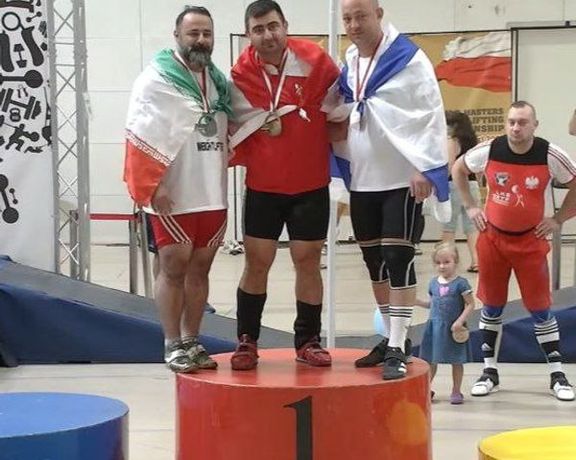
Mostafa Rajai Langroudi, a weightlifter has been banned from the sport after posing for a photograph with an Israeli at the World Master Weightlifting Championships in Poland.

Mostafa Rajai Langroudi, a weightlifter has been banned from the sport after posing for a photograph with an Israeli at the World Master Weightlifting Championships in Poland.
Sajjad Anoushiravani, the head of the Weightlifting Federation announced on Tuesday that Rajai has been banned from the sport for life after the podium photo was published. Simultaneously, Anoushiravani made the decision to dissolve the veterans' committee of the federation.
Anoushiravani said, "Upon becoming aware of this inexcusable incident, stringent actions were taken against those involved. The athlete responsible has received a lifetime ban, and upon conducting thorough investigations, resolute measures will be taken against all individuals implicated. Furthermore, effective immediately, all operations of the veteran athletes' committee will be terminated."
The Islamic Republic's anti-Israel policy has driven a significant number of Iranian athletes to refrain from competing against Israeli counterparts, often citing various pretexts. This stance has consequently led to the defection of numerous Iranian athletes seeking asylum in other countries.
While no official legislation prohibits Iranian athletes from playing against Israelis, pressure from federation officials often coerces athletes into intentionally losing matches, forfeiting games, or claiming injuries to evade encounters with Israeli competitors. Supreme Leader Ali Khamenei has consistently applauded Iranian athletes who opt out of competing against Israelis. In September 2021, he explicitly encouraged them to continue this stance even in the face of potential sanctions from international sports bodies.
Over the past few years, approximately 30 Iranian athletes have defected from national teams and sought asylum in foreign nations. Notable examples include Judo champion Saeid Mollaei and Greco-Roman wrestler Ali Arsalan.

Women's rights activists imprisoned in Gilan province in northern Iran have been subjected to severe beatings and mental abuse, Iran International can reveal.
According to information obtained by Iran International, Sara Jahani, a doctor at a hospital in Rasht, refused to share her phone's passcode with authorities and was beaten for this resistance.
Meanwhile, in the Ministry of Intelligence's detention center, Hooman Taheri, a Gilan-based activist, also suffered repeated severe assaults. Days after being transferred to the public ward, he still bears visible signs of a broken tooth, extensive facial swelling, and bruises on his neck and body.
It has been reported that some detainees have been denied communication privileges and visitation rights to prevent the disclosure of abuse.
Last Thursday, the Islamic Republic's security forces arrested several women's rights activists in the cities of Rasht, Fooman, Anzali, and Lahijan.
Condemning these detentions, hundreds of activists have called for their immediate release.
As the anniversary of Mahsa Amini's death at the hands of the hijab police approaches, the government's efforts to suppress activists, students, and teachers have escalated. Security agencies have recently been summoning and issuing threats over the phone to dozens of students across Iranian universities.
Various reports also highlight security pressure on families of those killed in the uprising, aiming to prevent gatherings on the anniversary of their children's deaths as well as desecration of victims’ graves.
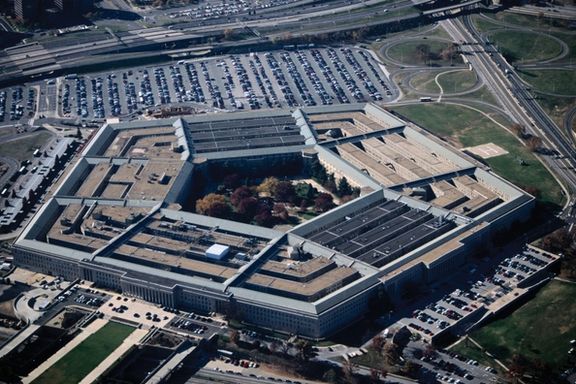
The US Defense Department has said that there is still a significant and ongoing threat to commercial ships in the Persian Gulf and the Strait of Hormuz off the coast of Iran.
In a statement on Tuesday, Sabrina Singh, Deputy Pentagon Spokesperson emphasized Iran's ongoing threat to commercial ships and commented on the substantial contingent of US forces stationed in the Middle East. "As long as there remains a need for these forces to be in the region, they're going to stay there,” she said.
She also referred to the IRGC presence in the waters of the region as harassment. “Over the past few weeks, we've seen harassment from IRGC-backed groups over commercial ships." Singh said, "We have not seen that threat drop, I would say, so we haven't seen a reason to move our forces out."
In July, the US Defense Secretary announced a strategic response to Iran's attempts to seize ships in the Persian Gulf and the Strait of Hormuz, which involves deploying naval and ground forces, including F-35 and F-16 fighter jets and missile-equipped destroyers.
Citing data, US authorities said that over the past two years, Iran has engaged in a series of disruptive activities targeting nearly 20 internationally-registered commercial ships.
Since 2019, Iran has consistently targeted commercial ships and oil tankers in the Persian Gulf, including seizing two more oil tankers and attempting to commandeer two other vessels.
The strategic significance of the Strait of Hormuz in global oil transit is undeniable, with approximately 20% of the world's crude oil traversing this critical chokepoint en route to international markets.
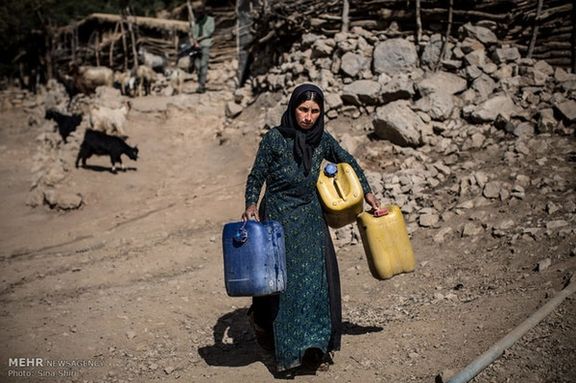
While the head of Iran's wealth fund issued a dire warning about future, the president pledged to provide "free" water, electricity, and gas to low-income households.
President Ebrahim Raisi made the claim during a press conference on Tuesday, stating "Providing free water, electricity, and gas to low-income families is on the government's agenda."
The president also claimed that "health insurance has been provided for six million people in the country for free."
"The government is cares about paying subsidies, providing housing for the deprived strata, as well as allocating land and providing facilities to the low-income households," he said, adding that “we have been committed to what we have said in the elections, and we will be; we have not forgotten any of those promises, and we will not forget them.”
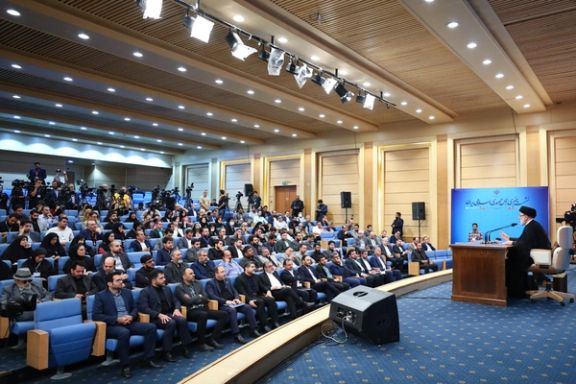
A day earlier, Mehdi Ghazanfari, the head of Iran's National Development Fund, warned that "people are worried about the day when we become servants of neighboring countries" because they are progressing rapidly, and Iran is not.
Highlighting that the regime only attaches importance to "military strength" as an element of national power, he warned that if Iran neglects "economic development coupled with high growth rates" it might become a country "devoid of its human resources and investment opportunities."
Ghazanfari said a new type of colonialism may take place in Iran in the face of prosperous and wealthy neighboring nations. “If the current trend persists in Iran, it may become a country in the future that imports gas from Turkmenistan, wheat from Saudi Arabia, depends on Oman and Qatar for medical services and Qatar, and on the UAE for maritime and aerial logistics,” he warned.
Raisi’s remarks were reminiscent of promises by the Islamic Republic’s founder Ruhollah Khomeini, who famously promised Iranians free electricity, water and a cash share of the oil export income in his first speech upon arrival to the country after exile during the 1979 revolution. Khomeini made a variety of promises to Iranians for his Islamic regime such as a popularly elected governments that would represent the people without the interference of the clergy in addition to abolishing homelessness.

Since the historic speech in February 1979, Iranian officials have made similar promises over the years, with former President Hassan Rouhani even claiming that he had managed to achieve these goals. Rouhani claimed in December 2020 that his government had realized Khomeini’s promise, providing low-income strata of the society with water, gas, and electricity free-of-charge.
Iran has survived on oil export revenues during 44 years of clerical rule and has used the income to provide tens of billion of dollars in subsidies to the population each year, while maintaining an unproductive, government controlled economy. The lack of planned and sustained economic growth, a closed economy not attractive for foreign investment and various foreign economic sanctions have led to the current crisis marked by very high inflation, low economic growth and increasing poverty.
Rouhani officials repeated bogus claims of more subsidies, with his government spokesman Ali Rabiei saying that some 35 percent of the country’s population – about 30 million people – had access to free utilities. “We supplied people with free gas, but we became self-sufficient in gas production beforehand so that we can meet the domestic demand in winter and even be able to export,” he said in 2020, a claim that contradicted reality, as more than 30 million Iranians live below the poverty line.
Elsewhere in his press conference, Raisi made other claims about the reduction in inflationary pace, a higher growth rate, and reduction in the unemployment rate.
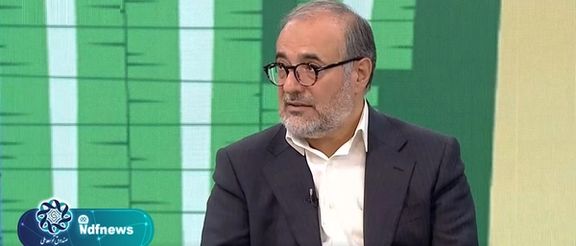
Over the past few years, many economists have warned about capital flight and the emigration of elites and skilled workers from Iran due to the Islamic Republic's policies.
The cost of living in Iran, including electricity, water, and gas bills, has consistently risen over the years and the majority of Iranians have fallen into poverty, no longer being able to afford meat and even fruit and vegetables, with consumption dropping by half.
The Islamic Republic has been struggling with high inflation since at least 2019, but the raging inflation in the past Iranian year which ended on March 20, was seriously different from previous years. Currently the official annual inflation rate is nearly 50 percent – the highest rate in Iran for more than 30 years-- but prices for foodstuff are most affected with some categories doubling or tripling in the past 12 months. The devaluation of Iran’s rial from 260,000 per US dollar to about 500,000 this year signals even higher economic woes for the people.

Iran’s regime has always pressured female athletes to abide by strict hijab rules during international games, but many are now refusing to obey despite repercussions.
Just last week, members of Iran's national women's muay thai team boldly challenged the regulations by competing unveiled at the Asian Championships held in Tashkent, Uzbekistan's capital.
This courageous act has triggered an outcry among hardliners, with some officials even disputing the team's official representation of the Islamic Republic. Others are calling on the Ministry of Sports to take decisive action to quell such open defiance.
The government has proposed a bill that, if approved, will impose heavy fines and other punishments on celebrities including athletes who appear unveiled in public.
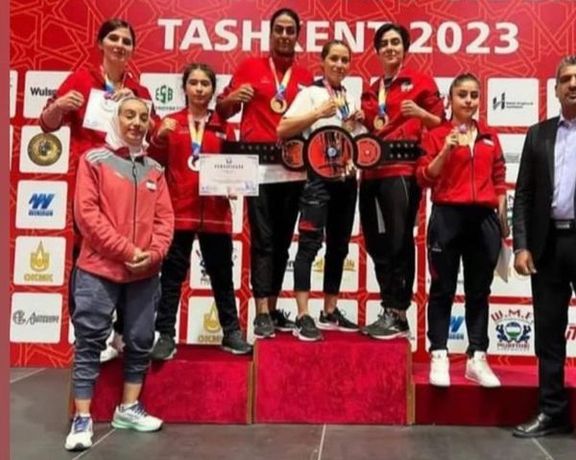
Over the past few years, several female athletes have chosen to compete unveiled at international events, seeking asylum abroad to avoid being compelled to return to Iran and face punishment. Notably, 19-year-old Dorsa Derakhshani, an International Master and Woman Grandmaster since 2016, was barred from the national team after refusing to wear a headscarf at the 2017 Gibraltar Chess Festival. She was then a temporary resident of Spain.
"Minutes before a match the deputy chairman of the federation would constantly whisper in my ear to be careful not to let my head cover to drop," Parisa Jahanfekrian, former weightlifting champion who is now living in Germany, told Iran International. Once in very warm weather he told me at least ten times to tuck my hair under my head cover only two minutes before the match.
"There, I was constantly thinking about the consequences if my head cover slipped back instead of thinking how to hold the halter and how to carryout my technic," she said.
It was agonizing to conform with all the dos and don'ts that were imposed on female athletes, Jahanfekrian told Iran International, adding that there would always be meetings before international competitions about hijab.
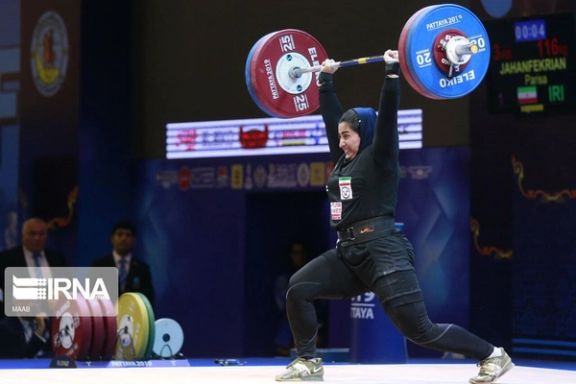
"They demanded that we always was wore a long tunic (called maanto in Iran) and a pullover headscarf with stitched front (called Maghna'e in Iran) when we left our rooms during our stay abroad.
Female athletes who defy hijab rules receive substantial support and are often hailed as heroes by the public. However, they also endure significant pressure from the authorities.
During the anti-government protests of the previous year, climber Elnaz Rekabi made a bold statement by discarding her hijab during the finals of a competition in South Korea, as an act of solidarity with the Woman, Life, Freedom protesters. She received a warm welcome upon her return to Iran after the competition.
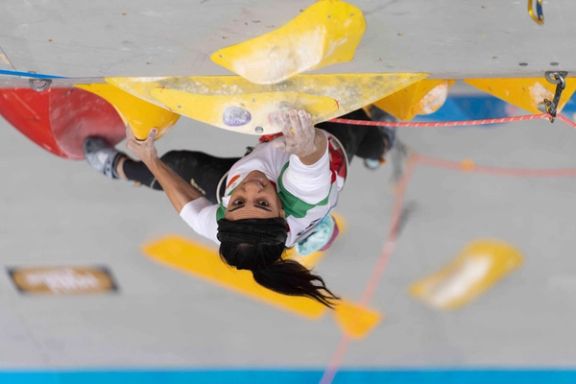
Soon after, state media released a video interview with her at the airport arrival hall. In the interview, she referred to her decision to appear without a hijab as "inadvertent." Many speculated that her statements were made under the pressure of regime agents. Social media users criticized the regime's attempts to undermine her convictions, noting that their efforts had ultimately failed.
People on social media said the regime had tried “to break this brave woman,” force her to repudiate her own convictions, and discredit her among hundreds of thousands of young girls who admired her “but as always, they failed.”
The regime has since then been faced with the dilemma of whether to allow women's participation at international competitions and ignore their defiance or keep them home.
The rule is that arms must be always covered to the wrist and legs to the ankle. Roya Mahboodi, an Asian Women’s Arm-Wrestling champion told Etemad daily in June that a government official banned the sport for some period of time because the wrist and a part of the elbow could be seen during matches.
She recounted how wearing a shaal (normal rectangular scarf), which lets more hair to cascade around the face and in the back, was banned whereas maghna'e tightly frames the face and comes down to the chest. Shaal has been the head cover of choice for many Iranian women who do not believe in wearing hijab but have to abide by the hijab rules.

PEN America, an organization that defends writers, journalists and protects freedom of artistic expression, has condemned the arrest of Iranian musician Mehdi Yarrahi.
In a statement released online, the organization called for Yarrahi’s immediate release and for all charges to be dropped against him.
Yarrahi was arrested after the release of his song ‘Your Headscarf’, a poignant critique of Iran's enduring mandatory hijab policy.
Simultaneously, the Iranian government announced a ban on "cultural activists" who they considered to be “acting against the nation's interests” including female artists and actors who remove their hijabs.
“These bans carried out against cultural activists serve as a grim reminder of the Iranian government’s continued campaign to suppress any artistic expression that dares to challenge the status quo.
The legal action taken against Mehdi Yarrahi is indicative of the Iranian regime’s systematic, brutal repression of democratic free expression. We stand in solidarity with Iran’s artists and cultural workers defending fundamental rights and freedoms, and demand that all charges against Yarrahi be dropped,” said Julie Trebault, director of Artists at Risk Connection.
Yarrahi's arrest is the latest development in a series of repressive measures imposed by the Iranian government, coinciding with the approaching one-year anniversary of the death of Amini, in police custody following her arrest for not wearing the mandatory headscarf.
Earlier this month, Iranian filmmaker Saeed Roustayi was sentenced to six months in prison for screening his award-winning film Leila’s Brothers at the Cannes Film Festival. Other prominent figures such as political rapper Toomaj Salehi and actress Taraneh Alidoosti have also faced persecution for their involvement in the September 2022 protests.
PEN America’s latest Freedom to Write Index — an annual count of writers in prison worldwide — found that Iran is the largest jailer of women writers globally.






